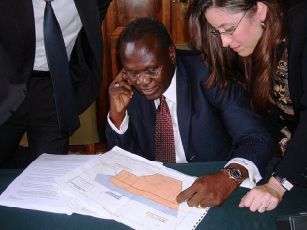“Soft borders” important between would-be independent South and North – Machar
November 16, 2010 (JUBA) – The second figure in the semi-autonomous Southern Sudan has reiterated his government’s commitment to maintain “soft borders” with northern Sudan in the event of southern Sudan becoming independent after the referendum vote in January 2011.

Vice President Riek Machar told a visiting delegation of the Carter Center in Juba that the two regions would still continue to need each other to build their economies, hence the importance of keeping the borders soft and allowing cross-border trade to flourish between them.
He said if the North understands such important future relations with the South, issues of post-referendum arrangements would not raise temperatures because they can be resolved amicably after the referenda in Southern Sudan and Abyei.
The two parties have yet to tackle the future of oil; its production, transportation and marketing, currency, security, water, citizenship, international treaties and agreements.
Machar said while it was important to tackle the issues such as citizenship in order to determine the status of southerners and northerners living in northern Sudan and vice versa so that they don’t immediately become stateless in the event of secession, others such as oil and international treaties can be deferred to after referendum.
The Vice President explained what is important at this point in time is for the two parties to agree on a framework assuring their commitment to resolve the outstanding issues peacefully even after the referendum.
He said the period after voting from 9 January to 9 July 2011 would be used to resolve the post-referendum issues, adding that even if the South would vote for secession in January 2011, its independence would only be launched on 9 July, six months after the voting result, in accordance with the 2005 peace deal.
Until 9 July when independence would be declared in the event of a vote for separation, he said, the post-referendum issues would have been resolved.
Production of oil which gives the South 98% of its overall annual revenues is located in the South while the pipelines flow northwards. Export terminals are also in the north.
The north on the other hand needs the oil as well as trade with the South and free movement of its nomadic tribes such as Messeriya to the southern grazing lands, among others.
In the South Machar added that the government would, after the secession vote in January 2011, call for the National Constitutional Review Commission to review the current Southern Sudan Interim Constitution and come up with a draft constitution, after which a constitutional conference would be called.
This would, he added, be followed by formation of a transitional government after 9 July, which lifespan would later on be agreed upon, before fresh elections could be organized in the newly independent state.
He brushed aside suggestions of a confederation between North and South, saying the South should vote first and determine such arrangements later.
(ST)
